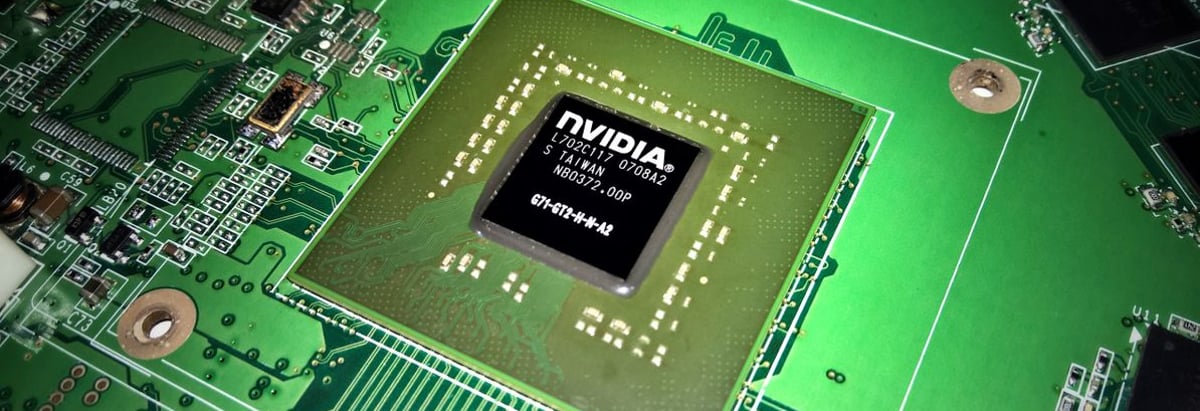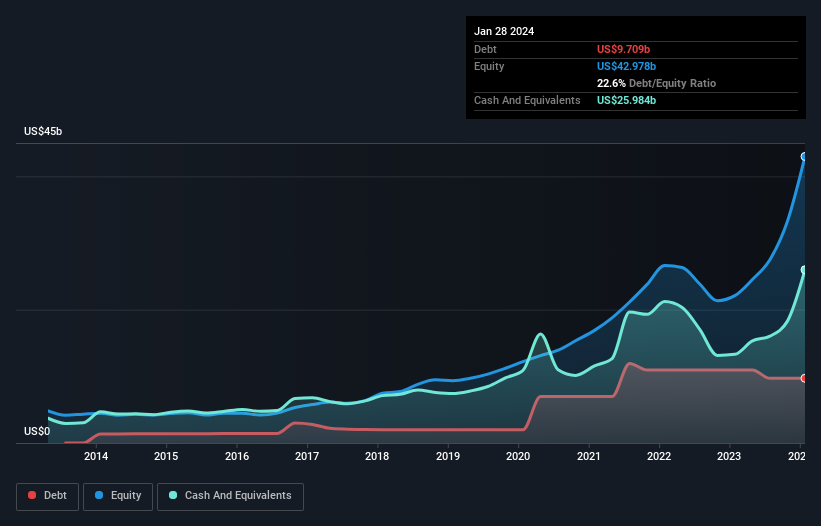
Howard Marks put it nicely when he said that, rather than worrying about share price volatility, 'The possibility of permanent loss is the risk I worry about... and every practical investor I know worries about.' When we think about how risky a company is, we always like to look at its use of debt, since debt overload can lead to ruin. As with many other companies NVIDIA Corporation (NASDAQ:NVDA) makes use of debt. But should shareholders be worried about its use of debt?
Why Does Debt Bring Risk?
Debt and other liabilities become risky for a business when it cannot easily fulfill those obligations, either with free cash flow or by raising capital at an attractive price. Ultimately, if the company can't fulfill its legal obligations to repay debt, shareholders could walk away with nothing. However, a more common (but still painful) scenario is that it has to raise new equity capital at a low price, thus permanently diluting shareholders. Of course, the upside of debt is that it often represents cheap capital, especially when it replaces dilution in a company with the ability to reinvest at high rates of return. When we think about a company's use of debt, we first look at cash and debt together.
View our latest analysis for NVIDIA
How Much Debt Does NVIDIA Carry?
As you can see below, NVIDIA had US$9.71b of debt at January 2024, down from US$11.0b a year prior. However, its balance sheet shows it holds US$26.0b in cash, so it actually has US$16.3b net cash.

How Healthy Is NVIDIA's Balance Sheet?
We can see from the most recent balance sheet that NVIDIA had liabilities of US$10.6b falling due within a year, and liabilities of US$12.1b due beyond that. Offsetting these obligations, it had cash of US$26.0b as well as receivables valued at US$10.00b due within 12 months. So it can boast US$13.2b more liquid assets than total liabilities.
Having regard to NVIDIA's size, it seems that its liquid assets are well balanced with its total liabilities. So while it's hard to imagine that the US$2.22t company is struggling for cash, we still think it's worth monitoring its balance sheet. Succinctly put, NVIDIA boasts net cash, so it's fair to say it does not have a heavy debt load!
Even more impressive was the fact that NVIDIA grew its EBIT by 489% over twelve months. That boost will make it even easier to pay down debt going forward. The balance sheet is clearly the area to focus on when you are analysing debt. But ultimately the future profitability of the business will decide if NVIDIA can strengthen its balance sheet over time. So if you want to see what the professionals think, you might find this free report on analyst profit forecasts to be interesting.
Finally, a company can only pay off debt with cold hard cash, not accounting profits. While NVIDIA has net cash on its balance sheet, it's still worth taking a look at its ability to convert earnings before interest and tax (EBIT) to free cash flow, to help us understand how quickly it is building (or eroding) that cash balance. Over the last three years, NVIDIA recorded free cash flow worth a fulsome 80% of its EBIT, which is stronger than we'd usually expect. That positions it well to pay down debt if desirable to do so.
Summing Up
While we empathize with investors who find debt concerning, you should keep in mind that NVIDIA has net cash of US$16.3b, as well as more liquid assets than liabilities. And it impressed us with free cash flow of US$27b, being 80% of its EBIT. So we don't think NVIDIA's use of debt is risky. When analysing debt levels, the balance sheet is the obvious place to start. However, not all investment risk resides within the balance sheet - far from it. To that end, you should be aware of the 1 warning sign we've spotted with NVIDIA .
When all is said and done, sometimes its easier to focus on companies that don't even need debt. Readers can access a list of growth stocks with zero net debt 100% free, right now.
Valuation is complex, but we're here to simplify it.
Discover if NVIDIA might be undervalued or overvalued with our detailed analysis, featuring fair value estimates, potential risks, dividends, insider trades, and its financial condition.
Access Free AnalysisHave feedback on this article? Concerned about the content? Get in touch with us directly. Alternatively, email editorial-team (at) simplywallst.com.
This article by Simply Wall St is general in nature. We provide commentary based on historical data and analyst forecasts only using an unbiased methodology and our articles are not intended to be financial advice. It does not constitute a recommendation to buy or sell any stock, and does not take account of your objectives, or your financial situation. We aim to bring you long-term focused analysis driven by fundamental data. Note that our analysis may not factor in the latest price-sensitive company announcements or qualitative material. Simply Wall St has no position in any stocks mentioned.
About NasdaqGS:NVDA
NVIDIA
A computing infrastructure company, provides graphics and compute and networking solutions in the United States, Singapore, Taiwan, China, Hong Kong, and internationally.
Flawless balance sheet with high growth potential.
Similar Companies
Market Insights
Community Narratives



